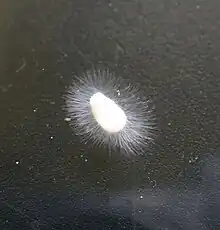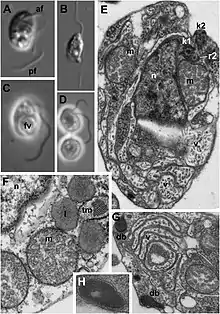| Gyrista | |
|---|---|
| Gyristan representatives (clockwise from top-left): water mould, brown algae, diatoms, Develorapax. | |
| Scientific classification | |
| Domain: | Eukaryota |
| Clade: | Diaphoretickes |
| Clade: | TSAR |
| Clade: | SAR |
| Clade: | Stramenopiles |
| Phylum: | Gyrista Cavalier-Smith 1998[1] |
| Classes[2] | |
| |
Gyrista is a phylum of heterokont protists containing three diverse groups: the mostly photosynthetic Ochrophyta, the parasitic Pseudofungi, and the recently described group of nanoflagellates known as Bigyromonada.[2] Members of this phylum are characterized by the presence of a helix or a double helix/ring system in the ciliary transition region.[1]
Phylogeny
Gyrista was seen in 2017 as the sister group to phylum Bigyra, which contains the Sagenista and Opalozoa. Together, Gyrista and Bigyra form the superphylum Stramenopiles or Heterokonta.[2][3]
| Stramenopiles |
| |||||||||||||||||||||||||||||||||
A phylogenetic analysis in 2022 recovered a monophyletic Bigyromonada sister to Pseudofungi. The "Bigyra" is paraphyletic:[4]
| Stramenopiles |
| ||||||||||||||||||||||||||||||
Classification
The 2018 revised taxonomy of Gyrista is the following,[2] with the inclusion of new ochrophyte classes described in 2020[5] and 2021:[6]
- Subphylum Bigyromonada Cavalier-Smith 1998
- Subphylum Pseudofungi Cavalier-Smith 1986 [=Heterokontimycotina M.W. Dick 1976]
- Class Hyphochytrea Cavalier-Smith 1986 [=Hyphochytriomycota Whittaker 1969]
- Class Oomycetes Winter in Rabenhorst 1879 [=Oomycota Arx 1967; Peronosporomycetes M.W. Dick 2001]
- Subphylum Ochrophytina Cavalier-Smith 1995 [=Heterokontophyta van den Hoek et al. 1978; Stramenochromes Leipe et al. 1994]
- Infraphylum Chrysista Cavalier-Smith 1991
- Superclass Limnistia Cavalier-Smith 1996 emend. 2006
- Class Eustigmatophyceae Hibberd & Leedale (1971)
- Class Chrysomonadea Saville-Kent 1881 stat. nov. Pascher 1910 emend. Cavalier-Smith 2017 [=Chrysophyceae Pascher 1914]
- Class Picophagea Cavalier-Smith 2006 emend. 2017 [=Synchromophyceae Horn et al. 2007]
- Superclass Raphidoistia Cavalier-Smith 1986 orth. mut. 2006
- Class Raphidomonadea Chadefaud ex Silva 1980
- Subclass Raphidophycidae Cavalier-Smith 2013
- Subclass Raphopoda Cavalier-Smith 2013
- Class Raphidomonadea Chadefaud ex Silva 1980
- Superclass Fucistia Cavalier-Smith 1995
- Class Aurophyceae Cavalier-Smith 2013
- Subclass Aurearenophycidae Kai Yoshii Nakayama & Inouye 2008 (as Aurearenophyceae)[7] stat. nov. Cavalier-Smith 2013[8]
- Subclass Phaeothamniophycidae Andersen & Bailey 1998 (as Phaeothamniophyceae) stat. nov. Cavalier-Smith 2006
- Class Chrysomerophyceae Cavalier-Smith 1995
- Class Chrysoparadoxophyceae Wetherbee et al. 2019
- Class Phaeosacciophyceae R.A.Andersen L.Graf & H.S.Yoon 2020[5]
- Class Schizocladiophyceae Henry Okuda & Kawai 2003
- Class Phaeophyceae Kjellman 1891 [=Fucophyceae Warming 1884; Melanophyceae Rabenhorst 1863]
- Subclass Discosporangiophycidae
- Subclass Ishigeophycidae Silberfeld F. Rousseau & Reviers 2014[9]
- Subclass Dictyotophycidae Silberfeld F. Rousseau & Reviers 2014[9]
- Subclass Fucophycidae Cavalier-Smith 1986
- Class Xanthophyceae Allorge ex Fritsch 1935 [=Tribophyceae Hibberd 1981;[10] Heterokontae Luther 1899]
- Class Aurophyceae Cavalier-Smith 2013
- Superclass Limnistia Cavalier-Smith 1996 emend. 2006
- Infraphylum Diatomista Derelle et al. ex Cavalier-Smith 2017
- Superclass Hypogyrista Cavalier-Smith 1995 stat. nov. 2006
- Class Dictyochophyceae Silva 1980 [=Dictyochia Haeckel 1894; Alophycidae Cavalier-Smith 2006]
- Subclass Pedinellia Cavalier-Smith 1986 stat. nov. 2017 [=Actinochrysophyceae Cavalier-Smith 1995; Axodines]
- Subclass Pelagophycidae Andersen & Saunders 1993 (as Pelagophyceae) ex Cavalier-Smith 2006
- ?Subclass Sulcophycidae Cavalier-Smith 2013 – ?Sulcochrysis[lower-alpha 1]
- Class Pinguiophyceae Kawachi et al. 2002
- Class Dictyochophyceae Silva 1980 [=Dictyochia Haeckel 1894; Alophycidae Cavalier-Smith 2006]
- Superclass Khakista Cavalier-Smith 2000 stat. nov. 2017
- Class Bolidophyceae
- Class Diatomeae [=Bacillariophyceae]
- Subclass Corethrophycidae Round & Crawford 1990
- Subclass Rhizosoleniophycidae Round & Crawford 1990
- Subclass Eucentricophycidae Cavalier-Smith 2000
- Subclass Bacillariophycidae [=Pennatia Pennatia Schütt 1896; =Pennatophycidae]
- Superclass Hypogyrista Cavalier-Smith 1995 stat. nov. 2006
- Ochrophytina incertae sedis
- Class Olisthodiscophyceae Barcytė Eikrem & M. Eliáš 2021[6]
- Infraphylum Chrysista Cavalier-Smith 1991
Notes
- ↑ Cavalier-Smith suggested that Sulcochrysis is possibly related to Olisthodiscus and grouped both genera within this subclass.[8][2] However a study in 2021 reveals that Olisthodiscales is part of a new class Olisthodiscophyceae which includes only the genus Olisthodiscus. The position of the genus Sulcochrysis remains uncertain due to a lack of DNA sequences.[6]
References
- 1 2 Cavalier-Smith T (August 1998). "A revised six-kingdom system of life". Biol Rev Camb Philos Soc. 73 (3): 203–266. doi:10.1017/s0006323198005167. PMID 9809012.
- 1 2 3 4 5 6 Cavalier-Smith, Thomas (2017). "Kingdom Chromista and its eight phyla: a new synthesis emphasising periplastid protein targeting, cytoskeletal and periplastid evolution, and ancient divergences". Protoplasma. 255 (1): 297–357. doi:10.1007/s00709-017-1147-3. PMC 5756292. PMID 28875267. S2CID 254085270.
- ↑ Derelle R, López-García P, Timpano H, Moreira D (November 2016). "A Phylogenomic Framework to Study the Diversity and Evolution of Stramenopiles (=Heterokonts)". Mol Biol Evol. 33 (11): 2890–2898. doi:10.1093/molbev/msw168. PMC 5482393. PMID 27512113.
- ↑ Cho A, Tikhonenkov DV, Hehenberger E, Karnkowska A, Mylnikov AP, Keeling PJ (2022). "Monophyly of diverse Bigyromonadea and their impact on phylogenomic relationships within stramenopiles" (PDF). Molecular Phylogenetics and Evolution. 171 (107468): 107468. doi:10.1016/j.ympev.2022.107468. ISSN 1055-7903. S2CID 247815732.
- 1 2 Graf L, Yang EC, Han KY, Küpper FC, Benes KM, Oyadomari JK, Herbert RJH, Verbruggen H, Wetherbee R, Andersen RA, Yoon HS (December 2020). "Multigene Phylogeny, Morphological Observation and Re-examination of the Literature Lead to the Description of the Phaeosacciophyceae Classis Nova and Four New Species of the Heterokontophyta SI Clade". Protist. 171 (6): 125781. doi:10.1016/j.protis.2020.125781. PMID 33278705. S2CID 227315556.
- 1 2 3 Dovilė Barcytė; Wenche Eikrem; Anette Engesmo; Sergio Seoane; Jens Wohlmann; Aleš Horák; Tatiana Yurchenko; Marek Eliáš (2 March 2021). "Olisthodiscus represents a new class of Ochrophyta". Journal of Phycology. 57 (4): 1094–1118. doi:10.1111/jpy.13155. hdl:10852/86515. PMID 33655496.
- ↑ Kai A, Yoshii Y, Nakayama T, Inouye I (2008). "Aurearenophyceae classis nova, a New Class of Heterokontophyta Based on a New Marine Unicellular Alga Aurearena cruciata gen. et sp. nov. Inhabiting Sandy Beaches". Protist. 159 (3): 435–457. doi:10.1016/j.protis.2007.12.003. ISSN 1434-4610. PMID 18358776.
- 1 2 Cavalier-Smith, Thomas; Scoble, Josephine Margaret (2012). "Phylogeny of Heterokonta: Incisomonas marina, a uniciliate gliding opalozoan related to Solenicola (Nanomonadea), and evidence that Actinophryida evolved from raphidophytes". European Journal of Protistology. 49 (3): 328–353. doi:10.1016/j.ejop.2012.09.002. PMID 23219323.
- 1 2 Silberfeld T, Rousseau F, de Reviers B (2014). "An Updated Classification of Brown Algae (Ochrophyta, Phaeophyceae)". Cryptogamie, Algologie. 35 (2): 117–156. doi:10.7872/crya.v35.iss2.2014.117. S2CID 86227768.
- ↑ Hibberd DJ (February 1981). "Notes on the taxonomy and nomenclature of the algal classes Eustigmatophyceae and Tribophyceae (synonym Xanthophyceae)". Botanical Journal of the Linnean Society. 82 (2): 93–119. doi:10.1111/j.1095-8339.1981.tb00954.x.

_-_geograph.org.uk_-_224125.jpg.webp)

